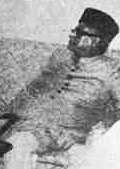East Pakistani legislative election, 1954
| ||||||||||||||||||||||||||||||||
| ||||||||||||||||||||||||||||||||
| ||||||||||||||||||||||||||||||||
Legislative elections were held in East Pakistan in 1954, the first since Pakistan became an independent country in 1947.
Background
The 1946 elections, in British India, were won by Pakistan's popular and charismatic founder, Muhammad Ali Jinnah, and the Muslim League formed the government. Consequent with the election victory, part of Bengal province became the eastern wing of Pakistan, known as East Pakistan.
The League had been weakened by the death of Jinnah, and the assassination of L. A. Khan. Likewise, governing a province just after independence and struggles in setting up a functional government and bureaucracy resulted in significant anti-League feelings when the elections finally came around in 1954.
The United Front was an assortment of leftist and Bengali nationalist parties, led by the Awami League, which sought greater provincial autonomy, from Karachi, the capital. The Awami League was joined by harder factions of the left, such as the Communists and regional agrarian parties. The United Front (UF) candidate became the head of the provincial government, the East Pakistan government.
Power struggle
Pakistan's first president was a Bengali, Iskander Mirza, and the premiership oscillated frequently, embodying the sense of political crisis – caused by a power vacuum at the top since the death of Jinnah and Liaqat Ali Khan. This election bolstered the Awami League and it got its candidate, a Bengali PM in Huseyn Shaheed Suhrawardy. Nonetheless there were deep divisions amongst Bengalis in which there were differences between privatisation or state-control, between pro-China/US foreign policy, pro-Soviet alignment, and between less democracy and democratisation, which was embodied by the authoritarian Iskander Mirza and Awami League, respectively.
Likewise, Pakistan's military, a well-resourced and well-funded state institution, due to necessity caused by the intense rivalry with India meant that the Army wielded disproportionate political influence. This influence was concentrated in the western parts, as more military resources were in the west due to the Kashmir dispute being between West Pakistan against India. The political collapse of the Muslim League meant that the Army and army-aligned businessmen in Karachi became the embodiment of Western Pakistani politics.
The elections and later political incumbency had exposed the divisions amongst the Bengali nationalist parties. The Muslim League had begun to re-organize itself and looked like it could regain some lost ground. Nonetheless, the 1958 Pakistani coup d'état was to be a turning point. After this, Bengalis of all stripes felt that they were being taken out of decision making. And Pakistan's capital shifted even further away from an East-West Pakistan balance. From Karachi on the coast, to deep into the countryside in Central West Pakistan. The new capital, Islamabad, near the Army HQ in Rawalpindi embodied the extent to which West Pakistani generals had completely usurped control from the conservative and weakened Muslim League (albeit the only party with significant levels support across all ethnic groups), which lost most of its popularity, prestige and political power in the lead up to 1970 elections. Likewise, the splinters which began to emerge from being in government were overcome and the Awami League went from strength to strength in East Pakistan. The Awami League continued to believe in a unified Pakistan through the 1970 elections, but wanted to weaken the power of the Federal government and transfer power to the provinces. It was only after the launch of Operation Searchlight, that the Awami League, the standard bearer of the Bengalis, opted to declare independence.

